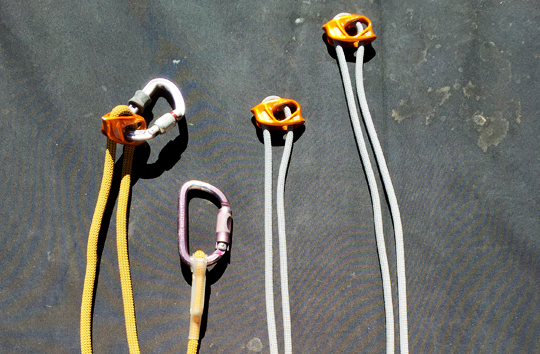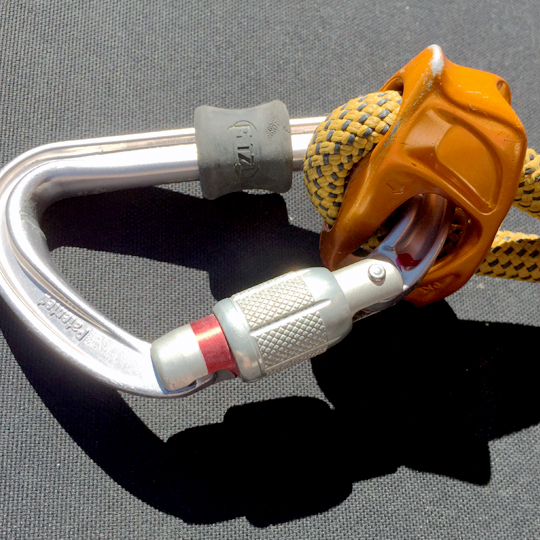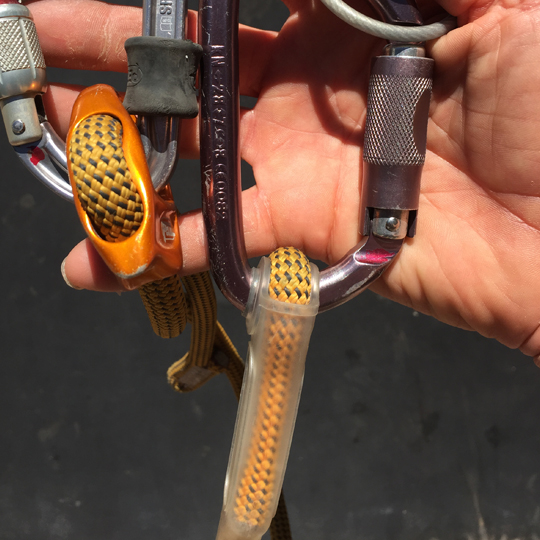[Photo] Mike Schneiter
As a guide, I hang my derriere over a cliff edge every day, often for hours at a time. I’m constantly securing myself into anchors while belaying, instructing and overseeing clients. In these cases, I like being snug on the anchor with my weight on the rope or another connection–it chases away the butterflies in my stomach. This year, I’ve been extensively using the Petzl devices–the Dual Connect Adjust, the Connect Adjust and the Evolv Adjust (an aid-climbing positioning device)–and they’ve won a regular spot on my harness.
All three items feature dynamic rope running through ergonomically shaped aluminum connectors. Simply pull on the rope to bring yourself closer to an anchor or piece. To loosen, let the rope slide through, one-handed, by changing the angle of the connector. The dynamic rope is a plus because it allows for a distribution of force if you fall, unlike the static nylon material used in slings, anchor chains or cordelettes. The Dual Connect Adjust and Connect Adjust use Petzl’s 9.5mm Arial rope, which allows the two devices to be used as strong lanyards for personal protection. The Evolv Adjust, using the smaller 7.7mm Paso rope, is not a personal protection lanyard, but a positioning device for aid climbing. All of the devices come in relatively compact packages with light weight, from 125 grams for the Connect Adjust, 160 grams for the Dual Connect Adjust and 220 grams for the Evolv Adjust.
When I first used them, I fumbled around trying to release the connectors, particularly with one hand. Pulling myself tight to an anchor was easy: just grab the rope and pull it smoothly through the connector. But it took a few days to develop the right motor skills to easily release myself. In the end, I learned that the process involves subtle positioning of your thumb and the inside of your first finger. Once I figured this out, I found them easy to adjust, and it quickly became second nature to clip into an anchor and get the precise positioning I wanted.
After about fifty days of use, apart the chalk and dirt that had ground into the rope, the aluminum connectors only showed only a few scratches in the anodized coloring from making contact with the rock.
Dual Connect Adjust
MSRP: $59.95
The Dual Connect Adjust–with one fixed arm and one adjustable arm–makes it convenient to properly anchor yourself in exposed places. Made with 9.5mm Arial rope, the Dual Connect meets the CE standard (15 kN) for use as personal protection. I used it to clip onto fixed lines on cliff tops, giving myself the security of two attachment points with the ability to unclip one arm to bypass an obstacle. I also used it on single-pitch terrain, like securing myself while cleaning or setting up anchors. The adjustable arm on the Dual Connect caught people’s attention, and I was the envy of other climbers when I easily adjusted my position at an anchor with a pull of the rope, rather than clipping or unclipping the loop to give the desired length at an anchor chain.

[Photo] Mike Schneiter
I used it extensively for rappelling multi-pitch routes, using the fixed arm to extend my belay device and the adjustable arm as a way to secure myself to an anchor. The easy-to-use rappel extension freed up my belay loop for a rappel backup.
PROS: One-handed adjustment of position; two arms for clipping into fixed lines; dedicated extension for rappel device; rated for personal protection.
CONS: Takes time and practice to learn release system on connectors.
Connect Adjust
MSRP: $49.95
The Petzl Connect Adjust, a single lanyard that has the same characteristics as the Dual Connect, has only a single adjustable arm. It is well suited for climbers who want a simple, adjustable device for anchoring while cleaning anchors.

[Photo] Mike Schneiter
Even though you can clean anchors by chaining quickdraws together, many climbers prefer a more secure tool that is dedicated to that task. With the Connect Adjust, you clip into the anchor and pull yourself tight in seconds.
PROS: Simple design with one arm; easy one-handed adjustment of position; rated for personal protection.
CONS: Limited to cleaning sport routes or anchoring on multi-pitch routes.
Evolv Adjust
MSRP: $74.95
For aid climbers, Petzl offers the Evolv Adjust (available August 2015) with two adjustable arms. The Evolv Adjust uses the 7.7mm Paso nylon rope, smaller in diameter than that of the Connect and Dual Connect Adjusts (9.5mm rope). But with a strength rating less than the 15 kN CE standard, the Adjust is not intended for personal protection like the lanyards. You need to be tied into the rope, as you would while aid climbing, when using it. The device’s rope, however, is dynamic; so if you blow your top placement and fall onto the piece below while the Adjust is clipped to it, the dynamic rope helps absorb the load instead of creating a static force like that created with a daisy chain.

[Photo] Mike Schneiter
I used the Evolv Adjust while aid climbing on single-pitch routes as well as multi-pitch desert towers. In my 15 years of aid experience, I usually used daisy chains and fifi hooks so it was a big transition to only use the Adjust.
When climbing desert sandstone routes, I found a great rhythm by pulling on the rope to bring myself up and then using one hand to release the other connector for my next piece. When you’re aid climbing with the Evolv Adjust, you can haul yourself up to each piece instead of climbing to it.
Sometimes I struggled with the connectors getting pinned against the rock or stuck behind gear. It was also difficult to find a fluid motion in my aid system to grab and smoothly release the connectors. I became annoyed with the longer lanyard length, about 20 inches longer when fully extended than the Dual Connect and Connect Adjust (with a range of 6 to 37 inches). For climbers used to adjustable daisy chains, I suspect they will quickly learn to use the Evolv Adjusts.
PROS: One-handed adjustment of position; easy to haul yourself up to a piece.
CONS: Not rated for personal protection; takes time and practice to learn release system on connectors.
Mike Schneiter is a longtime climbing guide and owner of Glenwood Climbing Guides in western Colorado.